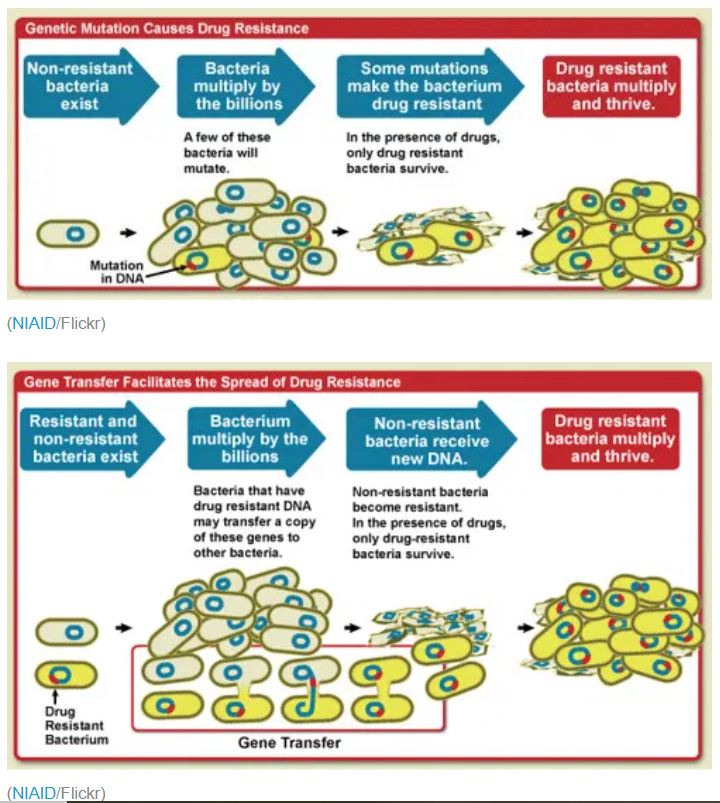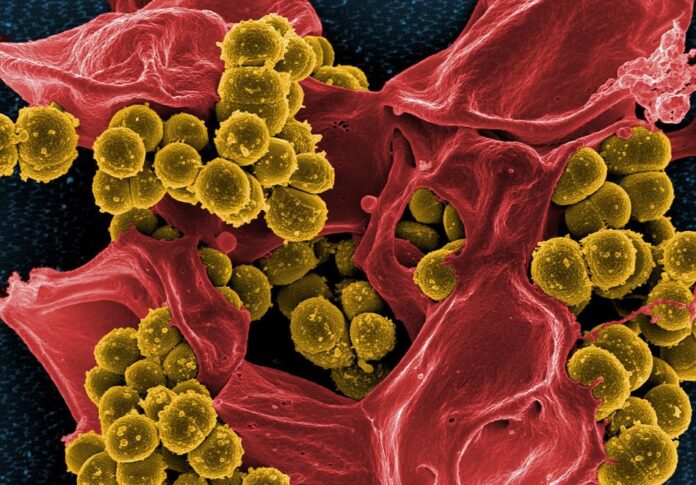Antibiotic-resistant staph bacteria can lie hidden on your skin for years!
Staphylococcus aureus (SA) is a bacterium found in the nose or on the skin of approximately 3 out of 10 healthy people. Most people do not know that they are carrying SA bacteria.
When these bacteria are in your nose or on the surface of your skin, they will not normally harm you. However, if SA bacteria get into or through your skin, they can cause a variety of infections, such as skin and wound infections. Sometimes, SA can cause serious infections in your blood, lungs or other tissues.
Methicillin-resistant Staphylococcus aureus (MRSA) bacteria are types of SA that have become resistant to some antibiotics that are used to treat SA infections. This problem was once mostly found in hospitals, however new strains of community-associated MRSA (CA-MRSA) now make up about 1 in 5 SA infections in the community.
RELATED: MRSA can Kill Within 24 Hours.
Why are MRSA a concern?
People with MRSA are not more likely to have a serious infection, but if they do the infection can be much harder to treat because of resistance to common antibiotics. CA-MRSA strains generally respond to more kinds of antibiotics than hospital strains although both can be difficult to treat.
How is MRSA spread?
Because SA can be on the surface of the skin, the most common way MRSA spreads from person to person is by direct contact, particularly if someone has a skin infection or a wound. It can also be spread from sharing things like towels, bedding or other personal items with someone who is colonized or has an SA infection.
For those who might be carrying MRSA, regular washing reduces the numbers carried on the skin and the chance of it causing an infection.
If you have an MRSA infection, you can prevent the spread by keeping wounds covered, cleaning your hands regularly, and not sharing personal items such as towels, washcloths, razors, clothing, or uniforms that may have had contact with a contaminated wound or bandage. There have been a few cases of transmission of MRSA between members of sports teams who have shared such items as towels or uniforms.
RELATED: RESIST THE RESISTANCE: A PRIMER ON ANTIBIOTICS & ANTIBIOTIC RESISTANCE
How common are MRSA?
MRSA now make up 17% of SA, and will be found on about 5% of people. Of those people, most show no signs of infection.
In hospitals, where MRSA infections can prove more serious, special precautions are used to prevent the spread of MRSA.
Should I get tested for MRSA?
Healthy people do not need to be tested for MRSA as the risk of becoming infected is very small.
What are my chances of getting infected with MRSA?
If you are healthy your chances of becoming sick with MRSA are low. Your doctor will likely consider MRSA if you have a typical SA infection like a boil or skin abscess. You may be at higher risk if you have had long-term, frequent, or intensive use of antibiotics. You may also be at higher risk if you have had intensive hospital care or surgery, particularly in hospitals where previous cases of MRSA have been reported. Injection drug users and people with long-term illnesses are also at higher risk.
How long does MRSA last?
Healthy people can carry MRSA in their nose, on their skin, or in wounds that do not heal for weeks or even years. People who carry MRSA can sometimes clear the bacteria from their bodies but the MRSA can return, particularly in people who take antibiotics.
How are MRSA infections treated?
If you carry MRSA in your nose or on your skin and you are healthy, you do not need treatment and you should continue with your normal activities. Although you do not pose a health risk to your family, co-workers, or to the public, it is important for you to wash your hands regularly using soap and water. Using an alcohol hand rub may prevent the spread of MRSA after touching surfaces with your hands. You do not need to disclose to your workplace, school, or daycare setting that you carry MRSA.
(Curator note: Since no one we know who isn’t in the hospital has ever been tested for MRSA, the disclosure issue is moot.)
Mild infections of the skin may only need to be treated with warm compresses or with draining if an abscess develops. If necessary, your doctor will prescribe antibiotics.
How can I prevent MRSA infections?
There is no vaccine to protect you from MRSA. The most important thing you can do is wash your hands before eating, drinking, smoking, applying personal care products, touching your face, nose or eyes, and after using the toilet. Wash your hands well for at least 20 seconds using warm water and soap (to help children wash their hands long enough, sing the ABC song). Use a paper towel to dry your hands. If soap and water are not available, use an alcohol-based hand sanitizer. Sanitizer can be used as long as your hands are not visibly dirty.
Some bacteria can survive on surfaces like railings, faucets and handles for days or even months. Regular cleaning of these surfaces with a household cleaner can also help reduce the spread of bacteria. CA-MRSA have been spread when people share towels or athletic clothing or equipment that would come into contact with skin. Players of organized sports are encouraged to use their own uniform and pads wherever possible.
What steps are taken to prevent the spread of MRSA in hospitals?
If you are visiting a hospital, follow hospital guidelines to prevent the spread of MRSA, including washing your hands or using hand sanitizer when entering and leaving the hospital and the patient’s room.
If you may be a carrier of MRSA and are going to be admitted into the hospital, let hospital admitting staff know. Steps will be taken to protect other patients and hospital staff from MRSA infection.
RELATE: This Protocol May Reduce MRSA Infections After Discharge From The Hospital













